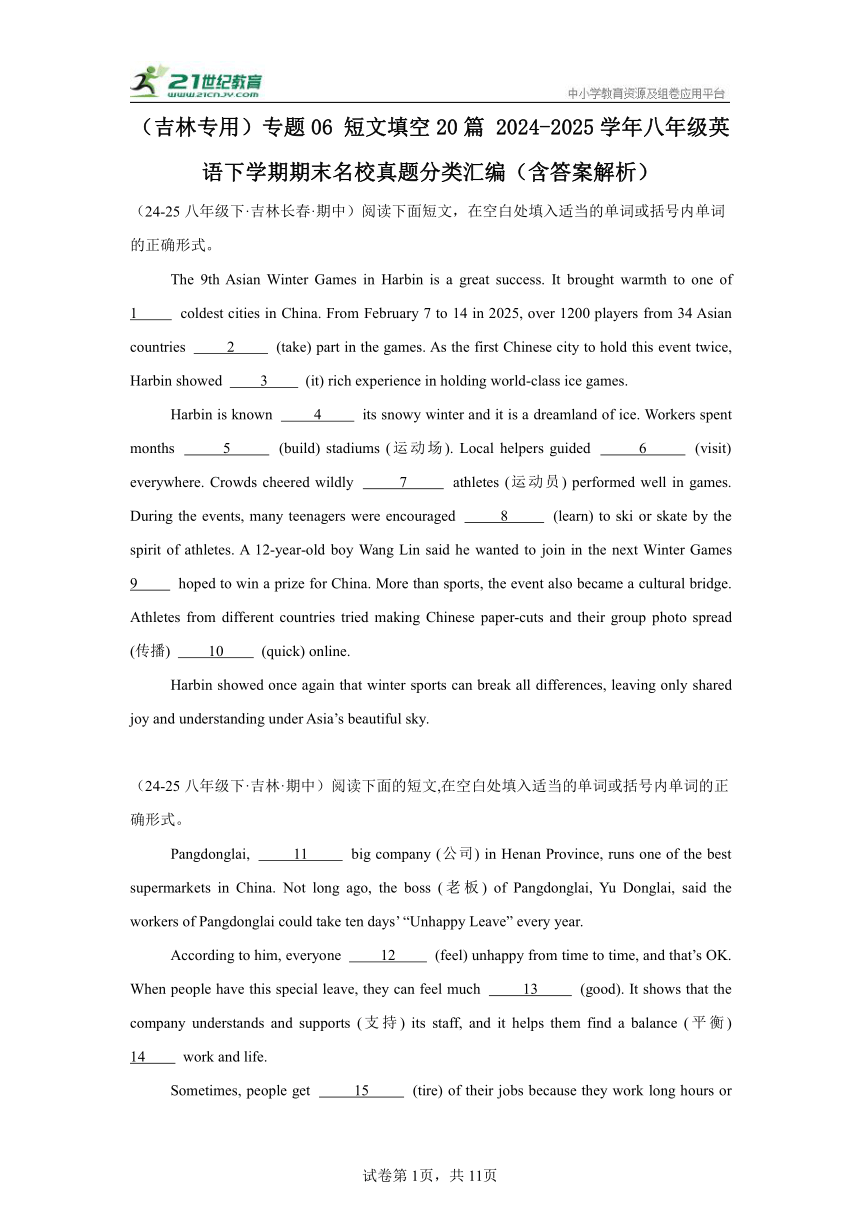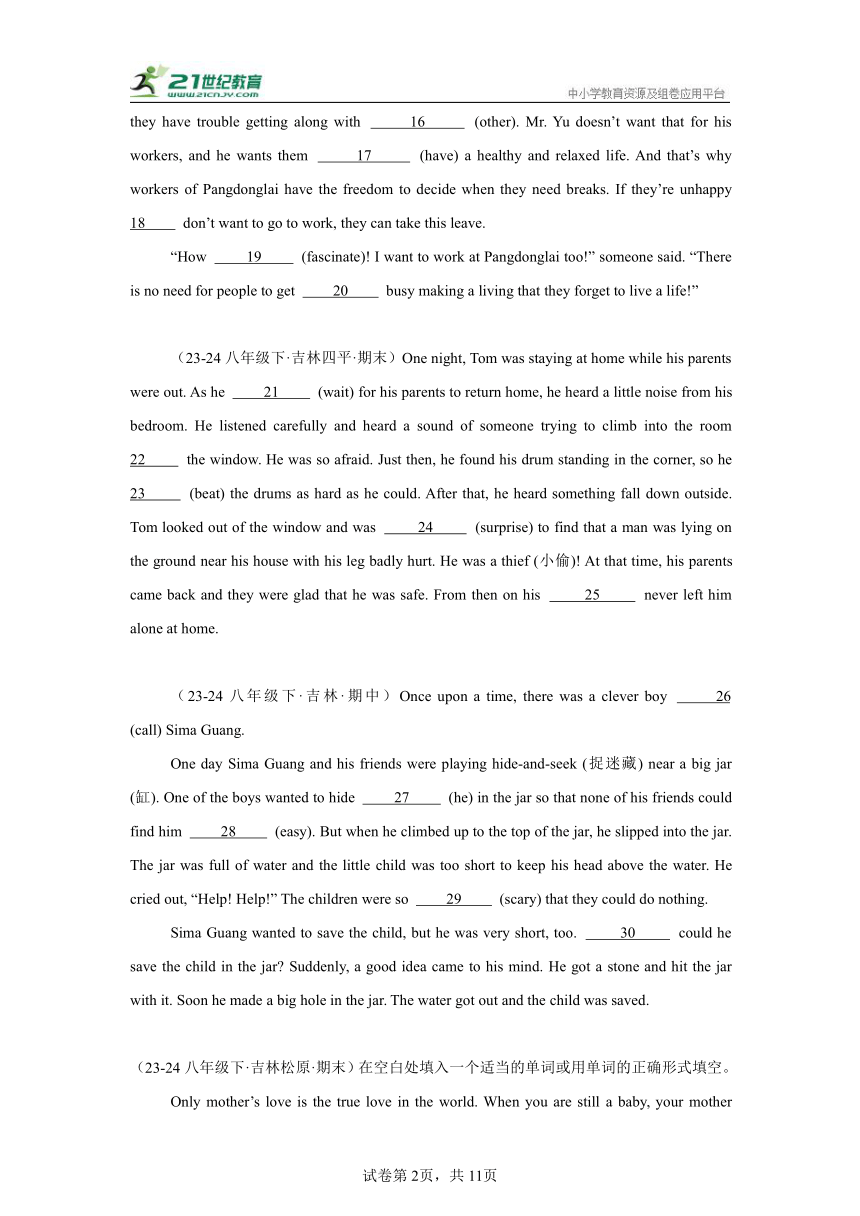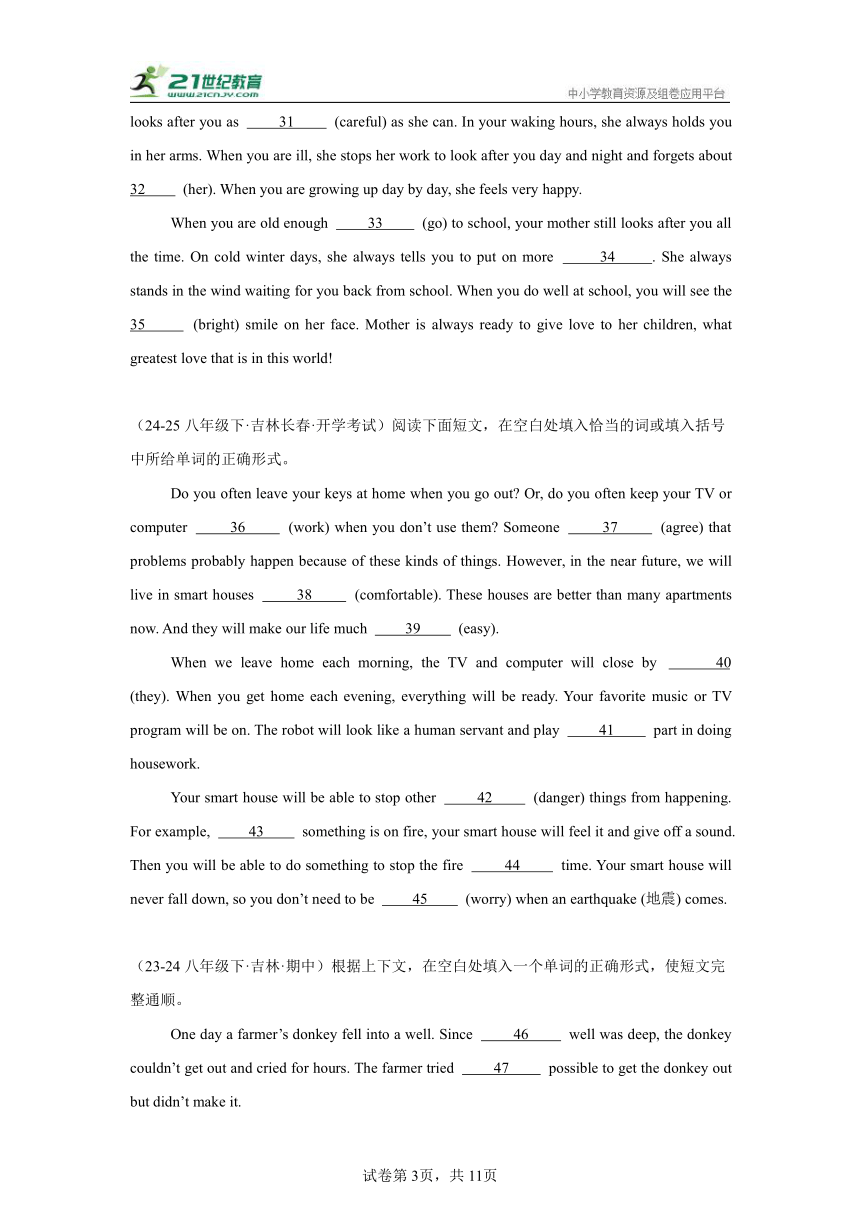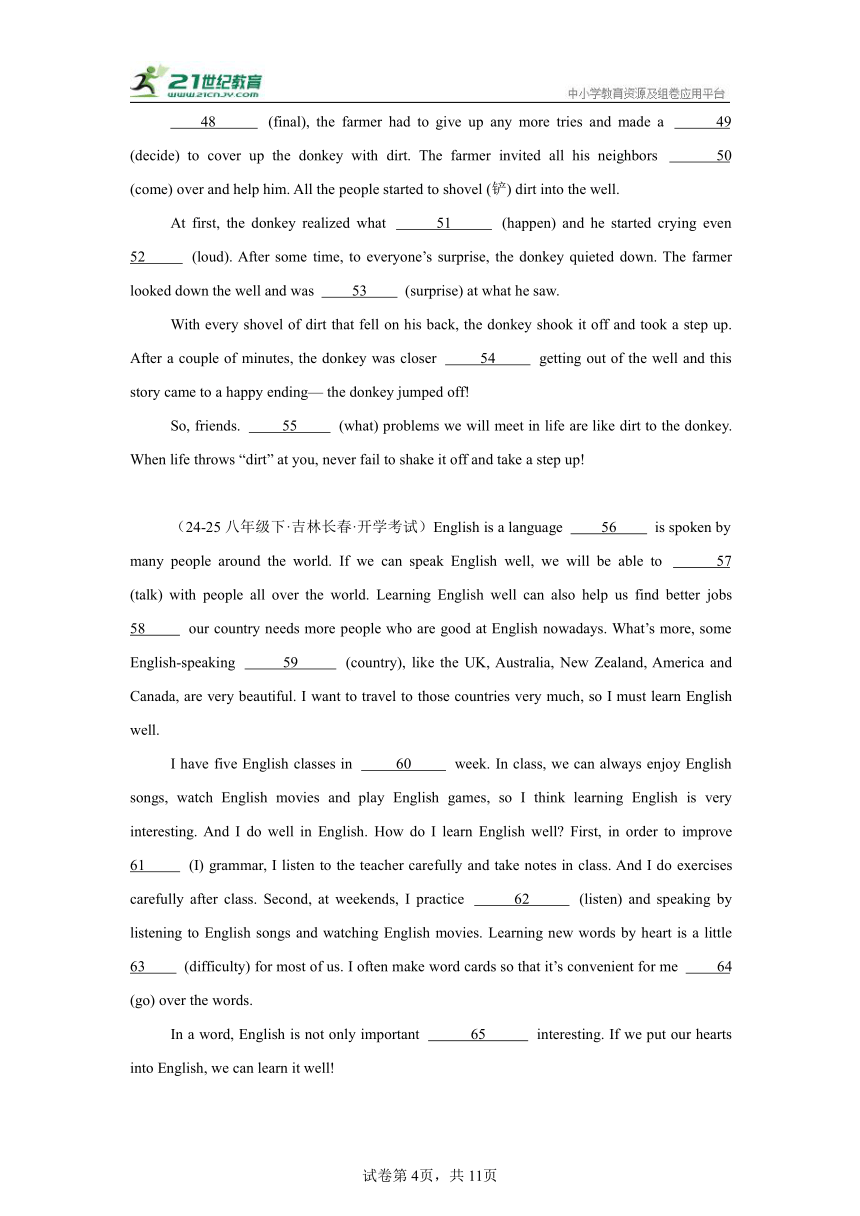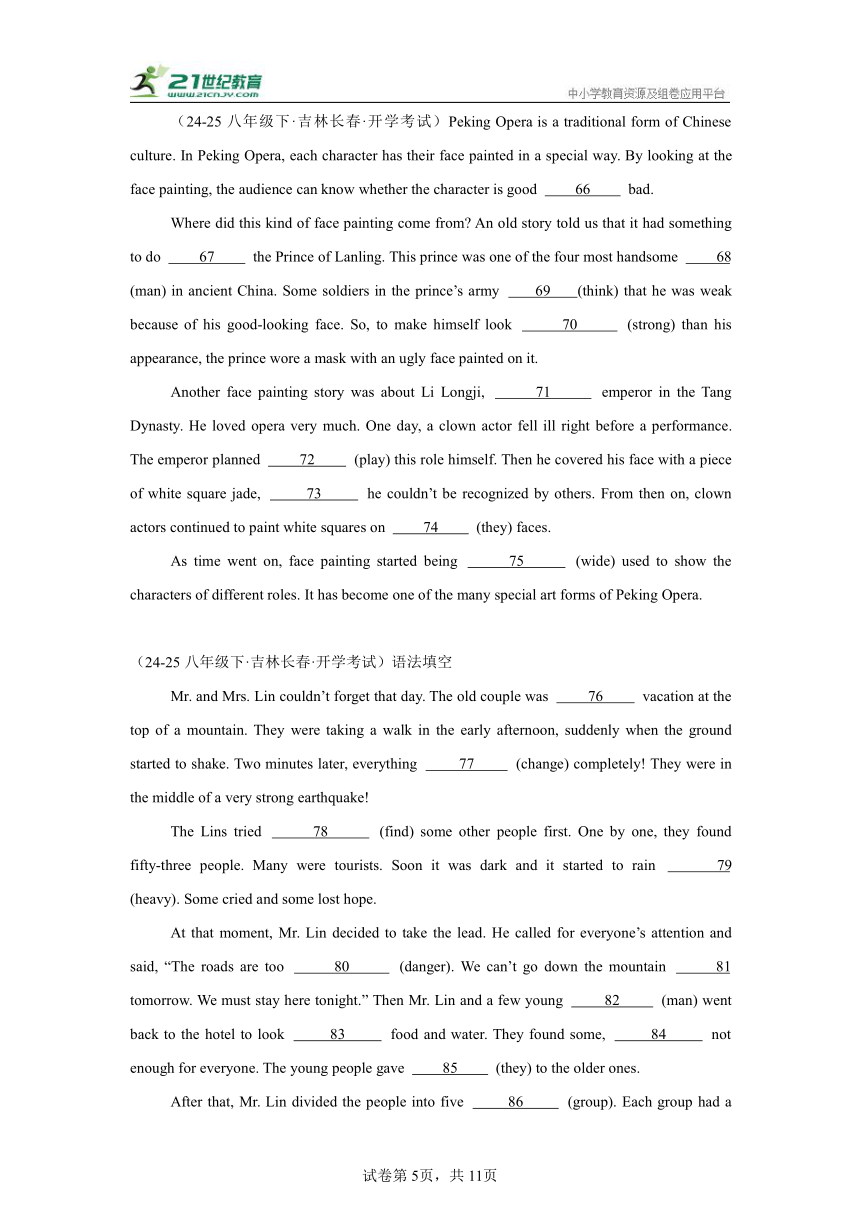 資源簡(jiǎn)介
資源簡(jiǎn)介
(吉林專(zhuān)用)專(zhuān)題06 短文填空20篇 2024-2025學(xué)年八年級(jí)英語(yǔ)下學(xué)期期末名校真題分類(lèi)匯編(含答案解析)
(24-25八年級(jí)下·吉林長(zhǎng)春·期中)閱讀下面短文,在空白處填入適當(dāng)?shù)膯卧~或括號(hào)內(nèi)單詞的正確形式。
The 9th Asian Winter Games in Harbin is a great success. It brought warmth to one of 1 coldest cities in China. From February 7 to 14 in 2025, over 1200 players from 34 Asian countries 2 (take) part in the games. As the first Chinese city to hold this event twice, Harbin showed 3 (it) rich experience in holding world-class ice games.
Harbin is known 4 its snowy winter and it is a dreamland of ice. Workers spent months 5 (build) stadiums (運(yùn)動(dòng)場(chǎng)). Local helpers guided 6 (visit) everywhere. Crowds cheered wildly 7 athletes (運(yùn)動(dòng)員) performed well in games. During the events, many teenagers were encouraged 8 (learn) to ski or skate by the spirit of athletes. A 12-year-old boy Wang Lin said he wanted to join in the next Winter Games 9 hoped to win a prize for China. More than sports, the event also became a cultural bridge. Athletes from different countries tried making Chinese paper-cuts and their group photo spread (傳播) 10 (quick) online.
Harbin showed once again that winter sports can break all differences, leaving only shared joy and understanding under Asia’s beautiful sky.
(24-25八年級(jí)下·吉林·期中)閱讀下面的短文,在空白處填入適當(dāng)?shù)膯卧~或括號(hào)內(nèi)單詞的正確形式。
Pangdonglai, 11 big company (公司) in Henan Province, runs one of the best supermarkets in China. Not long ago, the boss (老板) of Pangdonglai, Yu Donglai, said the workers of Pangdonglai could take ten days’ “Unhappy Leave” every year.
According to him, everyone 12 (feel) unhappy from time to time, and that’s OK. When people have this special leave, they can feel much 13 (good). It shows that the company understands and supports (支持) its staff, and it helps them find a balance (平衡) 14 work and life.
Sometimes, people get 15 (tire) of their jobs because they work long hours or they have trouble getting along with 16 (other). Mr. Yu doesn’t want that for his workers, and he wants them 17 (have) a healthy and relaxed life. And that’s why workers of Pangdonglai have the freedom to decide when they need breaks. If they’re unhappy 18 don’t want to go to work, they can take this leave.
“How 19 (fascinate)! I want to work at Pangdonglai too!” someone said. “There is no need for people to get 20 busy making a living that they forget to live a life!”
(23-24八年級(jí)下·吉林四平·期末)One night, Tom was staying at home while his parents were out. As he 21 (wait) for his parents to return home, he heard a little noise from his bedroom. He listened carefully and heard a sound of someone trying to climb into the room 22 the window. He was so afraid. Just then, he found his drum standing in the corner, so he 23 (beat) the drums as hard as he could. After that, he heard something fall down outside. Tom looked out of the window and was 24 (surprise) to find that a man was lying on the ground near his house with his leg badly hurt. He was a thief (小偷)! At that time, his parents came back and they were glad that he was safe. From then on his 25 never left him alone at home.
(23-24八年級(jí)下·吉林·期中)Once upon a time, there was a clever boy 26 (call) Sima Guang.
One day Sima Guang and his friends were playing hide-and-seek (捉迷藏) near a big jar (缸). One of the boys wanted to hide 27 (he) in the jar so that none of his friends could find him 28 (easy). But when he climbed up to the top of the jar, he slipped into the jar. The jar was full of water and the little child was too short to keep his head above the water. He cried out, “Help! Help!” The children were so 29 (scary) that they could do nothing.
Sima Guang wanted to save the child, but he was very short, too. 30 could he save the child in the jar Suddenly, a good idea came to his mind. He got a stone and hit the jar with it. Soon he made a big hole in the jar. The water got out and the child was saved.
(23-24八年級(jí)下·吉林松原·期末)在空白處填入一個(gè)適當(dāng)?shù)膯卧~或用單詞的正確形式填空。
Only mother’s love is the true love in the world. When you are still a baby, your mother looks after you as 31 (careful) as she can. In your waking hours, she always holds you in her arms. When you are ill, she stops her work to look after you day and night and forgets about 32 (her). When you are growing up day by day, she feels very happy.
When you are old enough 33 (go) to school, your mother still looks after you all the time. On cold winter days, she always tells you to put on more 34 . She always stands in the wind waiting for you back from school. When you do well at school, you will see the 35 (bright) smile on her face. Mother is always ready to give love to her children, what greatest love that is in this world!
(24-25八年級(jí)下·吉林長(zhǎng)春·開(kāi)學(xué)考試)閱讀下面短文,在空白處填入恰當(dāng)?shù)脑~或填入括號(hào)中所給單詞的正確形式。
Do you often leave your keys at home when you go out Or, do you often keep your TV or computer 36 (work) when you don’t use them Someone 37 (agree) that problems probably happen because of these kinds of things. However, in the near future, we will live in smart houses 38 (comfortable). These houses are better than many apartments now. And they will make our life much 39 (easy).
When we leave home each morning, the TV and computer will close by 40 (they). When you get home each evening, everything will be ready. Your favorite music or TV program will be on. The robot will look like a human servant and play 41 part in doing housework.
Your smart house will be able to stop other 42 (danger) things from happening. For example, 43 something is on fire, your smart house will feel it and give off a sound. Then you will be able to do something to stop the fire 44 time. Your smart house will never fall down, so you don’t need to be 45 (worry) when an earthquake (地震) comes.
(23-24八年級(jí)下·吉林·期中)根據(jù)上下文,在空白處填入一個(gè)單詞的正確形式,使短文完整通順。
One day a farmer’s donkey fell into a well. Since 46 well was deep, the donkey couldn’t get out and cried for hours. The farmer tried 47 possible to get the donkey out but didn’t make it.
48 (final), the farmer had to give up any more tries and made a 49 (decide) to cover up the donkey with dirt. The farmer invited all his neighbors 50 (come) over and help him. All the people started to shovel (鏟) dirt into the well.
At first, the donkey realized what 51 (happen) and he started crying even 52 (loud). After some time, to everyone’s surprise, the donkey quieted down. The farmer looked down the well and was 53 (surprise) at what he saw.
With every shovel of dirt that fell on his back, the donkey shook it off and took a step up. After a couple of minutes, the donkey was closer 54 getting out of the well and this story came to a happy ending— the donkey jumped off!
So, friends. 55 (what) problems we will meet in life are like dirt to the donkey. When life throws “dirt” at you, never fail to shake it off and take a step up!
(24-25八年級(jí)下·吉林長(zhǎng)春·開(kāi)學(xué)考試)English is a language 56 is spoken by many people around the world. If we can speak English well, we will be able to 57 (talk) with people all over the world. Learning English well can also help us find better jobs 58 our country needs more people who are good at English nowadays. What’s more, some English-speaking 59 (country), like the UK, Australia, New Zealand, America and Canada, are very beautiful. I want to travel to those countries very much, so I must learn English well.
I have five English classes in 60 week. In class, we can always enjoy English songs, watch English movies and play English games, so I think learning English is very interesting. And I do well in English. How do I learn English well First, in order to improve 61 (I) grammar, I listen to the teacher carefully and take notes in class. And I do exercises carefully after class. Second, at weekends, I practice 62 (listen) and speaking by listening to English songs and watching English movies. Learning new words by heart is a little 63 (difficulty) for most of us. I often make word cards so that it’s convenient for me 64 (go) over the words.
In a word, English is not only important 65 interesting. If we put our hearts into English, we can learn it well!
(24-25八年級(jí)下·吉林長(zhǎng)春·開(kāi)學(xué)考試)Peking Opera is a traditional form of Chinese culture. In Peking Opera, each character has their face painted in a special way. By looking at the face painting, the audience can know whether the character is good 66 bad.
Where did this kind of face painting come from An old story told us that it had something to do 67 the Prince of Lanling. This prince was one of the four most handsome 68 (man) in ancient China. Some soldiers in the prince’s army 69 (think) that he was weak because of his good-looking face. So, to make himself look 70 (strong) than his appearance, the prince wore a mask with an ugly face painted on it.
Another face painting story was about Li Longji, 71 emperor in the Tang Dynasty. He loved opera very much. One day, a clown actor fell ill right before a performance. The emperor planned 72 (play) this role himself. Then he covered his face with a piece of white square jade, 73 he couldn’t be recognized by others. From then on, clown actors continued to paint white squares on 74 (they) faces.
As time went on, face painting started being 75 (wide) used to show the characters of different roles. It has become one of the many special art forms of Peking Opera.
(24-25八年級(jí)下·吉林長(zhǎng)春·開(kāi)學(xué)考試)語(yǔ)法填空
Mr. and Mrs. Lin couldn’t forget that day. The old couple was 76 vacation at the top of a mountain. They were taking a walk in the early afternoon, suddenly when the ground started to shake. Two minutes later, everything 77 (change) completely! They were in the middle of a very strong earthquake!
The Lins tried 78 (find) some other people first. One by one, they found fifty-three people. Many were tourists. Soon it was dark and it started to rain 79 (heavy). Some cried and some lost hope.
At that moment, Mr. Lin decided to take the lead. He called for everyone’s attention and said, “The roads are too 80 (danger). We can’t go down the mountain 81 tomorrow. We must stay here tonight.” Then Mr. Lin and a few young 82 (man) went back to the hotel to look 83 food and water. They found some, 84 not enough for everyone. The young people gave 85 (they) to the older ones.
After that, Mr. Lin divided the people into five 86 (group). Each group had a leader. He also collected all the mobile phones and made sure each group had one. They used them 87 flash lights. Every thirty minutes, the group leaders flashed their mobile phones. And the light in the dark rainy night made everyone 88 (feel) safe.
Early the next morning, the groups started to go down the mountain. It was a 89 (hard) journey, but the group members encouraged and supported each other.
After twelve hours’ walking, they finally got out safely. By then, it was thirty hours after the earthquake. All of them were tired but they felt 90 (luck) because they were part of a special team.
This special team gave them hope for life.
91.(21-22八年級(jí)下·吉林·期末)春天,人們喜歡在公園里放風(fēng)箏。但兩千多年前,風(fēng)箏是作為一種戰(zhàn)時(shí)通訊工具出現(xiàn)的。直到明朝,放風(fēng)箏才成為娛樂(lè)項(xiàng)目。風(fēng)箏故鄉(xiāng)山東省濰坊市每年舉辦一次風(fēng)箏節(jié)來(lái)宣傳和弘揚(yáng)風(fēng)箏文化,成千上萬(wàn)的游客來(lái)到濰坊參加風(fēng)箏節(jié),體驗(yàn)風(fēng)箏文化。每空一詞。
This is a kite in the shape of a butterfly. It is made of bamboo and silk. In , people like to fly kites in parks. It is a good way to relax and fun. But when kites first appeared over 2,000 years ago, ancient people used kites to communicate with others during the war. In Ming Dynasty, people to make and fly kites for fun. Since then, kites have become more and more . Weifang in Shandong Province is the hometown of kites and it has a long history of making kites. Every year April, Weifang holds the International Kite Festival and thousands of people come to Weifang to take part in the activity. They make and fly different kinds of kites there.
(23-24八年級(jí)下·吉林長(zhǎng)春·期末)閱讀下面短文,在空白處填入適當(dāng)?shù)膯卧~或括號(hào)內(nèi)單詞的正確形式。
Susan Jones often noticed people walking with guide dogs in her city. She was always interested in how the guide dogs did their work. She 92 (find) the answer when she heard about the Seeing Eye program, whose purpose (目的) is to train dogs to be guides 93 blind people.
Last year, Susan and her family became Seeing Eye 94 (volunteer). They adopted (收養(yǎng)) a young Seeing Eye dog. “We spent a lot of time staying with him,” explained Susan. It took at least two years 95 (teach) the Seeing Eye dog all the skills he needed to guide a 96 (able) person.
During the first month of life, the little dog lived with the family. When the dog was about one year old, it left its home. A trainer and a blind person taught the dog some skills. After 97 long and difficult training period, the dog and the blind person finally teamed up.
Susan said there was a deep 98 (feel) between her and the little dog. “It was always hard 99 the time came to say goodbye,” she said. “But we knew that the little dog was going to help someone who 100 (strong) needed it. I feel good about having had a small part in giving the gift of 101 (independent) to someone who cannot see.”
(23-24八年級(jí)下·吉林延邊·期末)中國(guó)十多頭原本棲息在云南省西雙版納傣族自治州的野生亞洲象走出叢林,北上遷徙數(shù)百公里,引起了世界各國(guó)的廣泛關(guān)注,社交媒體網(wǎng)站紛紛報(bào)道,并對(duì)他們集體出走原因進(jìn)行了猜測(cè)。在這次事件當(dāng)中,中國(guó)政府及人民對(duì)保護(hù)大象而做出的努力,給世界樹(shù)立了一個(gè)好榜樣!讓世界看到一個(gè)美麗而溫情的中國(guó)!請(qǐng)你將下文補(bǔ)充完整,每空一詞。
The group of wild Asian elephants have wandered (漫游) over 500 km across China. Now they have got great international (國(guó)際的) attention from all over the world.
The New York Times made interesting guesses about the reasons 102 these elephants left their home. They said, “Maybe they’ve gotten 103 . Maybe they’re looking for better 104 and water. Maybe they just feel bored and want to hang out.”
The world sees China’s efforts (努力) to 105 the wild elephants. People treat the wild animals with respect. They don’t get close to them or hurt them. Chinese actions encourage humans from all over the world to get 106 well with animals.
(23-24八年級(jí)下·吉林松原·期末)根據(jù)短文內(nèi)容,在空白處用括號(hào)內(nèi)單詞的正確形式或提示填空。
There is one sea called the Dead Sea. It is so 107 (salt) that swimmers cannot sink (下沉). But fish cannot live in the Dead Sea because 108 (介詞) the seawater condition. The sea can be very cold. On the top the water may be warm for (因?yàn)? the sunshine. When you go down into it, the sea 109 (become) colder and colder. It’s a big challenge for people to go very deep into the sea. But in 1970, five women scientists 110 (success) in staying in the deep sea for fourteen days.
In most parts of the sea, there 111 (be) lots of 40 animals and plants. Some live near to the top of the sea while others live deep down.
(23-24八年級(jí)下·吉林白山·期末)根據(jù)短文內(nèi)容,在空白處填入一個(gè)適當(dāng)?shù)膯卧~,每空一詞。
It was raining heavily outside. We couldn’t go out, so we all 112 at home and did something we liked. My mother was 113 a talk show. She thought it was interesting, and she could learn something useful 114 it. My father was 115 books. It’s one of his habits. I was doing my homework. I study 116 because only by doing this can I get into my dream high school.
(23-24八年級(jí)下·吉林四平·期末)閱讀下面短文,在空白處填入適當(dāng)?shù)膯卧~或括號(hào)內(nèi)單詞的適當(dāng)形式。
Long long ago, ten 117 (sun) rose in the sky at the same time. It 118 (be) much too hot. Plants could hardly grow. People and animals could not 119 (live) long, either. There was a man whose name was Houyi. He was good at shooting. He shot nine suns down. Only one sun stayed in the sky. After that, the weather got much 120 (cool) than before. Thanks 121 Houyi, plants and animals could live. People were able to live happily from then on.
(23-24八年級(jí)下·吉林四平·期末)根據(jù)短文內(nèi)容,在空白處填入一個(gè)適當(dāng)?shù)膯卧~或用括號(hào)內(nèi)單詞的正確形式填空,每空一詞。
A King had two sons and asked famous teacher to teach them. After a few years, the king 122 (fall) ill. So he wanted to choose one of his sons as the next king. But which one would be the right person He decided to test his sons. One day, he gave a room to each of them. “You must fill the room 123 (complete) with anything you wish. But you can’t ask for 124 (advice) from anyone!” The next day, the king visited his elder son’s room. The room was filled with glass. The king felt sorry about it. Then he went to the other room. His 125 (young) son asked him to get in. It was dark everywhere, but suddenly, the second son lighted a candle and the room was 126 of light. The king felt very excited and hugged him proudly.
(23-24八年級(jí)下·吉林長(zhǎng)春·期末)閱讀下面短文,在空白處填入適當(dāng)?shù)膯卧~或括號(hào)內(nèi)單詞的正確形式.
Ann is a ten-year-old girl. On weekends, she doesn’t go to school and usually plays outside with her friends. It was Sunday yesterday and there was a storm. She didn’t know 127 to do after she finished her homework. Though it was raining 128 (heavy), she still wanted to go out. 129 her mother didn’t agree.
To get much fun, Ann tried to keep 130 (she) busy inside the house. She chose a book. However, she got bored and stopped 131 (read) after several passages.
Then, she decided to practice the guitar. It was one of her favorite 132 (hobby). She didn’t stop until lunch time. After finishing lunch, she sat by the window and watched the rain 133 silence.
While Ann 134 (watch) the rain, the phone suddenly rang. Her father called her to say he was coming home. Ann felt 135 (excite) because her father was away on business (出差) and she didn’t see her father for about a week. After about two hours, her father got home and gave Ann a gift. She really had 136 good time with her dad!
(23-24八年級(jí)下·吉林長(zhǎng)春·期末)閱讀下面短文,在空白處填入適當(dāng)?shù)膯卧~或括號(hào)內(nèi)單詞的正確形式。
The public (公共的) pianos in Shenzhen’s Huaqiangbei gave Yi Qunlin a fresh start. Yi Qunlin is 137 worker at a building place. On a hot summer day, Laoyi and his son 138 (pass) one of the pianos. His son knew Laoyi was interested 139 it, so he encouraged his father to have a try. He felt a little nervous at 140 (one), but as soon as his fingers touched the keys, confidence (自信) returned.
Yi Qunlin was born in a village of Hunan Province. At the age of 6, when most 141 (performer) began studying the piano at music schools, Yi learned the erhu from a group of people. Later, he first saw a piano when he visited his cousin’s house. Yi’s family was too poor to buy a piano for him then, so he used to visit his cousin. It took him about an hour 142 (get) there.
He worked in restaurants 143 factories when he first arrived in Shenzhen 19 years ago. He taught 144 to play many instruments (樂(lè)器) in his free time. He never thought that one day he would play the piano at a hall he helped build as a worker.
“It was like 145 (talk) with an old friend. I was so excited 146 my heart was still beating fast when I went back home,” Yi said. “Playing the piano in public is my dream. The public pianos make it come true.”
(23-24八年級(jí)下·吉林長(zhǎng)春·期末)閱讀下面短文,在空白處填入一個(gè)恰當(dāng)?shù)膯卧~或括號(hào)內(nèi)所給單詞的正確形式。
Mario loves animals and wants 147 (be) an animal doctor. He volunteers at an animal hospital every Saturday morning. Mario believes it can help him to get his future dream job. “It’s hard work,” he says, “but I want to learn 148 (much) about how to care for animals. I get such a strong 149 (feel) of satisfaction when I see the animals get better and the look of joy on their 150 (owner) faces.”
Mary is a book lover. She could read by 151 (she) at the age of four. Last year, she 152 (decide) to volunteer for an after-school reading program. She still works there once a week to help 153 (child) learn to read. “The kids are sitting in the library, 154 you can see in their eyes that they’re going on a different journey with each new book. Volunteering here is a dream come true 155 me. I can do 156 I love to do and help others at the same time.”
試卷第1頁(yè),共3頁(yè)
試卷第1頁(yè),共3頁(yè)
《(吉林專(zhuān)用)專(zhuān)題06 短文填空20篇 2024-2025學(xué)年八年級(jí)英語(yǔ)下學(xué)期期末名校真題分類(lèi)匯編(含答案解析)》參考答案
1.the 2.took 3.its 4.for 5.building 6.visitors 7.when 8.to learn 9.a(chǎn)nd 10.quickly
【導(dǎo)語(yǔ)】本文主要講述了2025年哈爾濱第九屆亞洲冬季運(yùn)動(dòng)會(huì)的成功舉辦,以及該賽事在體育和文化交流方面的重要意義。
1.句意:它給中國(guó)最冷的城市之一帶來(lái)了溫暖。形容詞最高級(jí)coldest前需加定冠詞the。故填the。
2.句意:2025年2月7日至14日,來(lái)自34個(gè)亞洲國(guó)家的1200多名運(yùn)動(dòng)員參加了比賽。根據(jù)時(shí)間狀語(yǔ)“From February 7 to 14 in 2025”可知,該句時(shí)態(tài)為一般過(guò)去時(shí),應(yīng)用提示詞take的過(guò)去式took作謂語(yǔ)。故填took。
3.句意:作為第一個(gè)兩次舉辦該賽事的中國(guó)城市,哈爾濱展示了其舉辦世界級(jí)冰雪賽事的豐富經(jīng)驗(yàn)。it“它”,代詞,又根據(jù)“Harbin showed…rich experience”可知,此處應(yīng)用其對(duì)應(yīng)的形容詞性物主代詞its“它的”作定語(yǔ)修飾名詞短語(yǔ)“rich experience”。故填its。
4.句意:哈爾濱以雪冬聞名,是冰雪的夢(mèng)幻之地。結(jié)合語(yǔ)境及常識(shí)可知,此處指哈爾濱以雪冬聞名,“be known for sth.”表示“以……聞名”。故填for。
5.句意:工人們花了幾個(gè)月時(shí)間建造運(yùn)動(dòng)場(chǎng)。build“修建”,動(dòng)詞,又分析句子結(jié)構(gòu)可知,該句考查“spend time (in) doing sth.”,表示“花費(fèi)時(shí)間做某事”,應(yīng)用building與之搭配。故填building。
6.句意:當(dāng)?shù)刂驹刚咭龑?dǎo)游客前往各處。visitor“游客”,可數(shù)名詞,結(jié)合語(yǔ)境及常識(shí)可知,此處應(yīng)用其名詞復(fù)數(shù)形式表泛指,表示“各地的游客”。故填visitors。
7.句意:當(dāng)運(yùn)動(dòng)員在比賽中表現(xiàn)出色時(shí),人群瘋狂地歡呼。分析題干,前后句“Crowds cheered wildly”及“athletes performed well in games”表示動(dòng)作發(fā)生的先后順序,應(yīng)用when引導(dǎo)時(shí)間狀語(yǔ)從句。故填when。
8.句意:在比賽期間,許多青少年受到運(yùn)動(dòng)員精神的鼓舞,學(xué)習(xí)滑雪或滑冰。learn“學(xué)會(huì)”,動(dòng)詞,且該句考查“encourage sb. to do sth.”,意為“鼓勵(lì)某人做某事”,應(yīng)用其對(duì)應(yīng)的動(dòng)詞不定式作賓語(yǔ)補(bǔ)足語(yǔ)。故填to learn。
9.句意:12歲的男孩王林說(shuō),他想?yún)⒓酉乱粚枚瑠W會(huì),并希望為中國(guó)贏(yíng)得一個(gè)獎(jiǎng)項(xiàng)。根據(jù)“he wanted to join in the next Winter Games…h(huán)oped to win a prize for China”及語(yǔ)境可知,此處表示并列關(guān)系,and“和”符合。故填and。
10.句意:來(lái)自不同國(guó)家的運(yùn)動(dòng)員嘗試制作中國(guó)剪紙,他們的集體照在網(wǎng)上迅速傳播開(kāi)來(lái)。分析句子結(jié)構(gòu)可知,該句結(jié)構(gòu)完整,應(yīng)用其對(duì)應(yīng)的副詞形式修飾動(dòng)詞spread。故填quickly。
11.a(chǎn) 12.feels 13.better 14.between 15.tired 16.others 17.to have 18.or 19.fascinating 20.so
【導(dǎo)語(yǔ)】本文主要介紹了河南胖東來(lái)公司推出的 “不開(kāi)心假” 政策,旨在幫助員工平衡工作與生活,提升幸福感。
11.句意:胖東來(lái)是河南省的一家大公司,經(jīng)營(yíng)著中國(guó)最好的超市之一。根據(jù)“Pangdonglai…big company (公司) in Henan Province, runs one of the best supermarkets in China.”的語(yǔ)境可知,此處表示泛指的含義,big是以輔音音素開(kāi)頭的單詞,用a。故填a。
12.句意:據(jù)他說(shuō),每個(gè)人都會(huì)時(shí)不時(shí)地感到不開(kāi)心,這沒(méi)關(guān)系。句子時(shí)態(tài)為一般現(xiàn)在時(shí),主語(yǔ)為“everyone”,用三單形式。故填feels。
13.句意:當(dāng)人們有這種特殊假期時(shí),他們會(huì)感覺(jué)好多了。根據(jù)空前的比較級(jí)修飾語(yǔ)“much”可知,此處用比較級(jí)better。故填better。
14.句意:這表明公司理解并支持員工,幫助他們?cè)诠ぷ骱蜕钪g找到平衡。find a balance between…and…“在……和……之間找到平衡”,是固定搭配。故填between。
15.句意:有時(shí),人們厭倦了他們的工作,因?yàn)樗麄児ぷ鲿r(shí)間長(zhǎng),或者他們很難與他人相處。get tired of“厭煩”,是固定搭配。故填tired。
16.句意:有時(shí),人們厭倦了他們的工作,因?yàn)樗麄児ぷ鲿r(shí)間長(zhǎng),或者他們很難與他人相處。根據(jù)“they have trouble getting along with…”的語(yǔ)境可知,此處指他們很難與他人相處,others“其他人員”符合。故填others。
17.句意:于先生不希望他的員工有這種情況,他希望他們過(guò)上健康輕松的生活。want sb. to do sth.“想要某人做某事”,是固定搭配。故填to have。
18.句意:如果他們不開(kāi)心或不想去上班,他們可以休假。根據(jù)“If they’re unhappy…don’t want to go to work, they can take this leave.”的語(yǔ)境可知,此處為選擇關(guān)系,or“或者”符合。故填or。
19.句意:太有吸引力了!分析句子結(jié)構(gòu)可知,此處應(yīng)用形容詞形式,根據(jù)“How…”的語(yǔ)境可知,此處指河南胖東來(lái)公司推出的“不開(kāi)心假”政策很棒,fascinating“迷人的;極有吸引力的”符合。故填fascinating。
20.句意:人們沒(méi)有必要忙于謀生,以至于忘記過(guò)自己的生活!根據(jù)“There is no need for people to get … busy making a living that they forget to live a life!”的語(yǔ)境可知,此處指人們沒(méi)有必要忙于謀生,以至于忘記過(guò)自己的生活,so…that…“如此……以至于……”,引導(dǎo)結(jié)果狀語(yǔ)從句。故填so。
21.was waiting 22.through 23.beat 24.surprised 25.parents
【導(dǎo)語(yǔ)】本文主要講述了Tom獨(dú)自在家時(shí)遇到小偷,通過(guò)敲鼓嚇退小偷的故事。
21.句意:當(dāng)他正在等父母回家時(shí),他聽(tīng)到臥室傳來(lái)輕微的聲音。根據(jù)“As he ... for his parents to return home”及“heard”可知,是指當(dāng)他正等父母回家時(shí),強(qiáng)調(diào)過(guò)去正進(jìn)行的動(dòng)作,時(shí)態(tài)用過(guò)去進(jìn)行時(shí)was/were doing,主語(yǔ)是he,be用was。故填was waiting。
22.句意:他仔細(xì)聽(tīng),聽(tīng)到有人試圖從窗戶(hù)爬進(jìn)房間的聲音。根據(jù)“climb into the room ... the window”可知,是指通過(guò)窗戶(hù)爬進(jìn)房間,用介詞through“通過(guò)”。故填through。
23.句意:就在這時(shí),他發(fā)現(xiàn)他的鼓站在角落里,所以他盡全力敲鼓。全文描述的是過(guò)去的事情,時(shí)態(tài)用一般過(guò)去時(shí),beat的過(guò)去式還是beat。故填beat。
24.句意:Tom從窗戶(hù)往外看,驚訝地發(fā)現(xiàn)一個(gè)男人躺在他家附近的地面上,腿受了重傷。根據(jù)“was”可知,空處用形容詞作表語(yǔ),此處修飾人,用-ed的形容詞。故填surprised。
25.句意:從那時(shí)起,他的父母再也不讓他獨(dú)自在家了。根據(jù)“his parents came back and they were glad that he was safe”可知,是指他的父母不再讓他獨(dú)自在家了,用名詞復(fù)數(shù)parents“父母”,作主語(yǔ)。故填parents。
26.called 27.himself 28.easily 29.scared 30.How
【導(dǎo)語(yǔ)】本文是一篇記敘文。主要講述了少年司馬光發(fā)揮自己的聰明才智,把掉進(jìn)大水缸的小伙伴救出來(lái)的故事。
26.句意:有一個(gè)男孩名字叫做司馬光。第一個(gè)空格是在“a clever boy”后面,后面的括號(hào)提示是“call”,這里應(yīng)該填一個(gè)過(guò)去分詞作后置定語(yǔ),表示“被稱(chēng)為司馬光的男孩”。call的過(guò)去分詞是called。故填called。
27.句意:其中一個(gè)小男孩想把自己藏在水缸里。第二個(gè)空格在“hide”后面,括號(hào)提示是“he”,這里應(yīng)該填反身代詞himself作為hide的賓語(yǔ),表示把“他自己”藏進(jìn)缸里。故填himself。
28.句意:因此他的朋友們都不能輕易找到他。第三個(gè)空在“find”后面,括號(hào)提示是“easy”,這里需要副詞形式,修飾動(dòng)詞find,表示“不能輕易找到”。故填easily。
29.句意:小伙伴們都害怕極了做不了任何事情。第四個(gè)空在“were so”后面,括號(hào)提示是“scary”,這里需要用形容詞。“scary”是形容詞,表示“令人害怕的”,而scared則表示“感到害怕的”符合語(yǔ)境。故填scared。
30.句意:他如何才能救出缸里的小孩呢?第五個(gè)空在“he save the child”前面,句子是問(wèn)句,缺少疑問(wèn)詞。根據(jù)上下文,司馬光很矮,他如何救孩子呢?所以這里應(yīng)該填How,構(gòu)成“How could he save…”,表示“他如何才能救那個(gè)孩子呢?”。同時(shí)注意句首應(yīng)大寫(xiě)。故填How。
31.carefully 32.herself 33.to go 34.clothes 35.brightest
【導(dǎo)語(yǔ)】本文主要講述了母愛(ài)的偉大和無(wú)私。
31.句意:當(dāng)你還是個(gè)嬰兒時(shí),你的母親會(huì)盡可能細(xì)心地照顧你。as ... as結(jié)構(gòu)中,中間用形容詞或副詞的原級(jí),此處修飾動(dòng)詞短語(yǔ)look after,應(yīng)用副詞原級(jí)。故填carefully。
32.句意:當(dāng)你生病時(shí),她會(huì)停下工作日夜照顧你,而忘記了自己。根據(jù)“she stops her work to look after you day and night and forgets about ...”可知,是指母親會(huì)忘了她自己,用反身代詞herself“她自己”。故填herself。
33.句意:當(dāng)你足夠大可以去上學(xué)時(shí),你的母親仍然一直照顧著你。old enough to do sth“足夠大去做某事”,空處用不定式作結(jié)果狀語(yǔ)。故填to go。
34.句意:在寒冷的冬天,她總是告訴你多穿衣服。根據(jù)“On cold winter days”可知,是指寒冷的冬天,母親告訴你要多穿衣服,用名詞clothes“衣服”,作賓語(yǔ)。故填clothes。
35.句意:當(dāng)你在學(xué)校表現(xiàn)好時(shí),你會(huì)看到她臉上最燦爛的笑容。根據(jù)“the ... smile on her face”可知,是指她臉上最燦爛的笑容,用最高級(jí)形式。故填brightest。
36.working 37.a(chǎn)grees 38.comfortably 39.easier 40.themselves 41.a(chǎn) 42.dangerous 43.if 44.in 45.worried
【導(dǎo)語(yǔ)】本文講述了未來(lái)智能家居的概念及其如何改善我們的生活。
36.句意:或者,當(dāng)你不使用電視或電腦的時(shí)候,你經(jīng)常讓它們一直開(kāi)著嗎?keep sth doing sth“讓某物一直做某事”,為固定短語(yǔ)。故填working。
37.句意:有人認(rèn)為問(wèn)題可能是由于這些事情而發(fā)生的。此句是一般現(xiàn)在時(shí),主語(yǔ)是不定代詞,謂語(yǔ)動(dòng)詞用三單形式。故填agrees。
38.句意:然而,在不久的將來(lái),我們將舒適地住在智能房子里。空處修飾動(dòng)詞,應(yīng)用副詞comfortably。故填comfortably。
39.句意:并且它們將使我們的生活更加輕松。much用來(lái)修飾形容詞的比較級(jí)。故填easier。
40.句意:當(dāng)我們每天早上離開(kāi)家的時(shí)候,電視和電腦將會(huì)自動(dòng)關(guān)閉。by oneself“獨(dú)自”,they的反身代詞是themselves。故填themselves。
41.句意:機(jī)器人將會(huì)看起來(lái)像一個(gè)人類(lèi)仆人并且在做家務(wù)方面發(fā)揮作用。play a part in“在……起作用”。故填a。
42.句意:你的智能房子將能夠阻止其他危險(xiǎn)的事情發(fā)生。空處作定語(yǔ)修飾名詞things,應(yīng)用形容詞dangerous。故填dangerous。
43.句意:例如,如果有東西著火了,你的智能房子將會(huì)感覺(jué)到并且發(fā)出聲音。根據(jù)“... something is on fire, your smart house will feel it and give off a sound.”可知,這里表達(dá)的是一種假設(shè)的情況,if引導(dǎo)條件狀語(yǔ)從句,意為“如果”,符合語(yǔ)境,故填if。
44.句意:然后你將能夠及時(shí)采取措施來(lái)阻止火災(zāi)。in time“及時(shí)”,這里表示能夠及時(shí)阻止火災(zāi)。故填in。
45.句意:你的智能房子永遠(yuǎn)不會(huì)倒塌,所以當(dāng)?shù)卣饋?lái)臨時(shí)你不需要擔(dān)心。be worried“擔(dān)心”,形容詞作表語(yǔ)。故填worried。
46.the 47.everything 48.Finally 49.decision 50.to come 51.was happening 52.louder 53.surprised 54.to 55.Whatever
【導(dǎo)語(yǔ)】本文是一篇記敘文,講述了一頭驢掉進(jìn)深井后,農(nóng)夫和鄰居們?cè)噲D用土掩埋它,但驢子通過(guò)抖落身上的土并一步步爬出井的故事,寓意生活中遇到的困難可以通過(guò)積極應(yīng)對(duì)來(lái)克服。
46.句意:因?yàn)榫苌睿H子無(wú)法出來(lái),哭了好幾個(gè)小時(shí)。此處特指前文提到的“well”,需用定冠詞“the”表示特指。故填the。
47.句意:農(nóng)夫嘗試了一切可能的方法讓驢子出來(lái),但沒(méi)成功。“try everything possible”固定搭配,表示“嘗試所有可能”。故填everything。
48.句意:最終,農(nóng)夫放棄了嘗試,他做了一個(gè)決定,用土掩埋驢子。根據(jù)提示詞及空格所在位置可知,需用副詞“Finally”作時(shí)間狀語(yǔ),位于句首,首字母大寫(xiě),故填Finally。
49.句意:最終,農(nóng)夫放棄了嘗試,他做了一個(gè)決定,用土掩埋驢子。根據(jù)提示詞可知,不定冠詞“a”后需接名詞,“decide”的名詞形式為“decision”。故填decision。
50.句意:農(nóng)夫邀請(qǐng)他所有的鄰居們來(lái)幫忙。“invite sb. to do”是固定搭配,表示“邀請(qǐng)某人做某事”。故填to come。
51.句意:起初,驢子意識(shí)到正在發(fā)生什么,哭得更厲害了。根據(jù)“At first”和上下文,動(dòng)作是過(guò)去某一時(shí)刻正在進(jìn)行的,用過(guò)去進(jìn)行時(shí)。故填was happening。
52.句意:起初,驢子意識(shí)到正在發(fā)生什么,哭得更厲害了。由“even”可知需用比較級(jí),“l(fā)oud”的比較級(jí)為“l(fā)ouder”。故填louder。
53.句意:農(nóng)夫往井里看,對(duì)所見(jiàn)感到驚訝。“be surprised at”是固定搭配,表示“對(duì)……感到驚訝”。故填surprised。
54.句意:幾分鐘后,驢子離井口更近了,這個(gè)故事有一個(gè)圓滿(mǎn)的結(jié)局——驢子跳了出來(lái)!“closer to”是固定搭配,表示“更接近……”。故填to。
55.句意:無(wú)論生活中遇到什么問(wèn)題,都要像驢子對(duì)待泥土一樣。空格引導(dǎo)讓步狀語(yǔ)從句,表示“無(wú)論什么”,用“Whatever”。故填Whatever。
56.that/which 57.talk 58.because 59.countries 60.a(chǎn) 61.my 62.listening 63.difficult 64.to go 65.but
【導(dǎo)語(yǔ)】本文講述了英語(yǔ)學(xué)習(xí)的重要性、趣味性以及作者學(xué)習(xí)英語(yǔ)的方法和經(jīng)歷。
56.句意:英語(yǔ)是世界上許多人都說(shuō)的語(yǔ)言。分析句子可知,空處到句末為定語(yǔ)從句,修飾先行詞“l(fā)anguage”,為物,且空處在從句中作主語(yǔ),可用that/which引導(dǎo)該從句。故填that/which。
57.句意:如果我們能說(shuō)一口流利的英語(yǔ),我們就能和世界各地的人交談。be able to do sth.“能夠做某事”。故填talk。
58.句意:學(xué)好英語(yǔ)也可以幫助我們找到更好的工作,因?yàn)槲覀兊膰?guó)家現(xiàn)在需要更多擅長(zhǎng)英語(yǔ)的人。分析句子可知,空格前后句是因果關(guān)系,前果后因,應(yīng)用because引導(dǎo)原因狀語(yǔ)從句。故填because。
59.句意:更重要的是,一些說(shuō)英語(yǔ)的國(guó)家,如英國(guó)、澳大利亞、新西蘭、美國(guó)和加拿大,都非常美麗。country“國(guó)家”為可數(shù)名詞,“some”修飾可數(shù)名詞的復(fù)數(shù)形式countries。故填countries。
60.句意:我一星期有五節(jié)英語(yǔ)課。根據(jù)“I have five English classes in...week.”可知,此處指一周有五節(jié)課,應(yīng)用不定冠詞表示“一”,且“week”是以輔音音素開(kāi)頭,應(yīng)用a。故填a。
61.句意:首先,為了提高我的語(yǔ)法,我認(rèn)真聽(tīng)老師講課,在課堂上做筆記。修飾名詞“grammar”應(yīng)用形容詞性物主代詞my“我的”。故填my。
62.句意:其次,在周末,我通過(guò)聽(tīng)英語(yǔ)歌曲和看英語(yǔ)電影來(lái)練習(xí)聽(tīng)力和口語(yǔ)。根據(jù)“and”可知,此處與“speaking”并列,應(yīng)用動(dòng)名詞listening。故填listening。
63.句意:背誦新單詞對(duì)我們大多數(shù)人來(lái)說(shuō)有點(diǎn)困難。difficulty“困難”,名詞;“is”后接形容詞difficult“困難的”作表語(yǔ),表示主語(yǔ)“Learning new words by heart”的難易程度。故填difficult。
64.句意:我經(jīng)常做單詞卡,這樣便于我復(fù)習(xí)單詞。it is+adj.+for sb.+to do sth.是固定句式,表示“做某事對(duì)某人來(lái)說(shuō)是怎么樣的”。故填to go。
65.句意:總之,英語(yǔ)不僅重要而且有趣。not only...but (also)...“不僅……而且……”,為固定短語(yǔ)。故填but。
66.or 67.with 68.men 69.thought 70.stronger 71.a(chǎn)n 72.to play 73.so 74.their 75.widely
【導(dǎo)語(yǔ)】本文主要通過(guò)兩個(gè)故事介紹了京劇臉譜的來(lái)歷。
66.句意:通過(guò)觀(guān)察臉譜,觀(guān)眾可以知道角色是好是壞。根據(jù)“By looking at the face painting, the audience can know whether the character is good…bad.”的語(yǔ)境可知,此處表示選擇關(guān)系,or“或者”符合。故填or。
67.句意:一個(gè)古老的故事告訴我們,它與蘭陵王有關(guān)。have something to do with…“跟……有關(guān)系”,是固定詞組。故填with。
68.句意:這位王子是中國(guó)古代四大美男之一。根據(jù)空前的“one of”可知,此處用復(fù)數(shù)形式men。故填men。
69.句意:王子軍隊(duì)中的一些士兵認(rèn)為他因?yàn)殚L(zhǎng)相英俊而軟弱。此處表示過(guò)去的事情,應(yīng)用一般過(guò)去時(shí)thought。故填thought。
70.句意:所以,為了讓自己看起來(lái)比外表更強(qiáng)壯,王子戴了一個(gè)畫(huà)著丑陋面孔的面具。根據(jù)空后的“than”可知,此處應(yīng)用比較級(jí)形式。故填stronger。
71.句意:另一個(gè)臉譜故事是關(guān)于李隆基的,唐朝的一位皇帝。根據(jù)“Another face painting story was about Li Longji…emperor in the Tang Dynasty.”的語(yǔ)境可知,此處表示泛指,emperor是以元音音素開(kāi)頭的單詞,用an。故填an。
72.句意:皇帝計(jì)劃親自扮演這個(gè)角色。plan to do sth.“計(jì)劃做某事”,是固定詞組。故填to play。
73.句意:然后他用一塊白色的方形玉石遮住臉,這樣別人就認(rèn)不出他了。根據(jù)“Then he covered his face with a piece of white square jade…h(huán)e couldn’t be recognized by others.”的語(yǔ)境可知,此處表示目的,用so“為了”。故填so。
74.句意:從那時(shí)起,丑角演員繼續(xù)在他們的臉上畫(huà)白色方塊。根據(jù)空后的名詞“faces”及語(yǔ)境可知,此處用形容詞性物主代詞their“他們的”,對(duì)其進(jìn)行修飾。故填their。
75.句意:隨著時(shí)間的推移,臉譜開(kāi)始被廣泛用于展示不同角色的性格。分析句子結(jié)構(gòu)可知,此處應(yīng)用副詞形式,作狀語(yǔ),widely“廣泛地”符合。故填widely。
76.on 77.changed 78.to find 79.heavily 80.dangerous 81.until 82.men 83.for 84.but 85.theirs 86.groups 87.a(chǎn)s 88.feel 89.hard 90.lucky
【導(dǎo)語(yǔ)】本文是一篇記敘文,講述了林先生和妻子在山頂度假時(shí)遭遇地震,林先生帶領(lǐng)一群人團(tuán)結(jié)互助,最終安全脫險(xiǎn)的故事。
76.句意:這對(duì)老夫婦在山頂度假。“on vacation”是固定短語(yǔ),意思是“度假”,符合語(yǔ)境。故填on。
77.句意:兩分鐘后,一切都完全改變了!根據(jù)上文“They were taking a walk in the early afternoon, suddenly when the ground started to shake.”可知,事情發(fā)生在過(guò)去,用一般過(guò)去時(shí),“change”的過(guò)去式是“changed”。故填changed。
78.句意:林夫婦首先試圖找到一些其他人。“try to do sth.”是固定用法,意思是“試圖做某事”,這里表示試圖找其他人,所以用“to find”。故填to find。
79.句意:很快天黑了,并且開(kāi)始下大雨。“rain”是動(dòng)詞,要用副詞修飾,“heavy”是形容詞,其副詞形式是“heavily”,“rain heavily”表示“下大雨”。故填heavily。
80.句意:道路太危險(xiǎn)了。“are”是系動(dòng)詞,后接形容詞作表語(yǔ),“danger”是名詞,其形容詞形式是“dangerous”,意為 “危險(xiǎn)的”。故填dangerous。
81.句意:直到明天我們才能下山。“not...until...”是固定搭配,意思是“直到……才……”,符合語(yǔ)境,這里表示直到明天才能下山。故填until。
82.句意:然后林先生和幾個(gè)年輕人回到酒店去找食物和水。“a few”后接可數(shù)名詞復(fù)數(shù),“man”的復(fù)數(shù)形式是“men”。故填men。
83.句意:然后林先生和幾個(gè)年輕人回到酒店去找食物和水。“l(fā)ook for”是固定短語(yǔ),意思是“尋找”,符合語(yǔ)境。故填for。
84.句意:他們找到了一些,但是不夠每個(gè)人吃。根據(jù)“They found some”和“not enough for everyone”可知,前后句之間是轉(zhuǎn)折關(guān)系,用“but”連接。故填but。
85.句意:年輕人把它們給了年紀(jì)大的人。“gave”是動(dòng)詞,后接賓格代詞作賓語(yǔ),“they”的賓格形式是“them”,這里指代找到的食物和水。故填them。
86.句意:在那之后,林先生把人們分成了五組。“five”后接可數(shù)名詞復(fù)數(shù),“group”的復(fù)數(shù)形式是“groups”。故填groups。
87.句意:他們把它們當(dāng)作手電筒用。“use sth. as...”是固定用法,意思是“把某物當(dāng)作……用”,這里表示把手機(jī)當(dāng)作手電筒用,所以用“as”。故填as。
88.句意:黑暗雨夜中的燈光讓每個(gè)人都感到安全。“make sb. do sth.”是固定用法,意思是“讓某人做某事”,“feel”是動(dòng)詞,意為“感覺(jué)”,這里用動(dòng)詞原形。故填feel。
89.句意:這是一段艱難的旅程,但是小組成員們互相鼓勵(lì)和支持。“journey”是名詞,前面用形容詞修飾,“hard”是形容詞,意為“艱難的”,符合語(yǔ)境。故填hard。
90.句意:他們都很累,但是他們感到幸運(yùn),因?yàn)樗麄兪且粋€(gè)特殊團(tuán)隊(duì)的一部分。“feel”是系動(dòng)詞,后接形容詞作表語(yǔ),“l(fā)uck”是名詞,其形容詞形式是“l(fā)ucky”,意為“幸運(yùn)的”。故填lucky。
91. spring have started popular in
【導(dǎo)語(yǔ)】本文主要介紹了風(fēng)箏的做法以及風(fēng)箏的用途。
【小題1】句意:春天,人們喜歡在公園放風(fēng)箏。根據(jù)“people like to fly kites in parks.”以及常識(shí)可知,春天人們喜歡放風(fēng)箏。spring意為“春天”。故填spring。
【小題2】句意:這是放松和娛樂(lè)的好方法。have fun意為“玩得開(kāi)心”,固定詞組。故填have。
【小題3】句意:在明朝,人們開(kāi)始制作和放風(fēng)箏取樂(lè)。根據(jù)“In Ming Dynasty, people…to make and fly kites for fun.”可知,此處說(shuō)的是明朝開(kāi)始制作風(fēng)箏,start意為“開(kāi)始”,事情發(fā)生在過(guò)去,此處用動(dòng)詞過(guò)去式started。故填started。
【小題4】句意:從那以后,風(fēng)箏變得越來(lái)越受歡迎。根據(jù)“Since then, kites have become more and more…”以及下文可知,此處說(shuō)的是風(fēng)箏很受歡迎,popular意為“受歡迎的”,形容詞作表語(yǔ)。故填popular。
【小題5】句意:每年四月,濰坊舉辦國(guó)際風(fēng)箏節(jié),成千上萬(wàn)的人來(lái)到濰坊參加這項(xiàng)活動(dòng)。在幾月份用介詞in。故填in。
92.found 93.for 94.volunteers 95.to teach 96.disabled 97.a(chǎn) 98.feeling 99.when 100.strongly 101.independence
【導(dǎo)語(yǔ)】本文講述了Susan在一次給導(dǎo)盲犬當(dāng)志愿者的經(jīng)歷中,她明白了一只普通的小狗是如何一步步地成長(zhǎng)為盲人的向?qū)У摹?br/>92.句意:當(dāng)她聽(tīng)說(shuō)Seeing Eye program時(shí),她找到了答案。根據(jù)“She…the answer when she heard about the Seeing Eye program”可知,句子時(shí)態(tài)為一般過(guò)去時(shí),此處應(yīng)用動(dòng)詞的過(guò)去式。故填found。
93.句意:其目的是訓(xùn)練狗成為盲人的向?qū)А8鶕?jù)“whose purpose (目的) i s to train dogs to be guides…blind people.”可知,此處表示“為盲人”,用介詞for,短語(yǔ)be guide for意為“作向?qū)А薄9侍頵or。
94.句意:去年,蘇珊和她的家人成為Seeing Eye program的志愿者。根據(jù)空前的“Susan and her family”及提示詞可知,此處應(yīng)用名詞復(fù)數(shù)形式。故填volunteers。
95.句意:教會(huì)導(dǎo)盲犬所有給盲人引路的技能花了至少兩年的時(shí)間。根據(jù)“It took at least two years…the Seeing Eye dog…”及提示詞可知,該句為句型“It takes/took sb. some time to dosth.”,意為“做某事花費(fèi)某人多少時(shí)間”,動(dòng)詞不定式作主語(yǔ),故填to teach。
96. 句意:教會(huì)導(dǎo)盲犬所有給盲人引路的技能花了至少兩年的時(shí)間。根據(jù)“he needed to guide a…person.”及提示詞可知,able“有能力的”,其反義詞為disabled“喪失能力的”,此處用形容詞disabled修飾名詞person,表示殘疾人。故填disabled。
97.句意:經(jīng)過(guò)一段漫長(zhǎng)的艱難的訓(xùn)練時(shí)期,狗和盲人終于結(jié)成一隊(duì)。根據(jù)“After…long and difficult training period, the dog and the blind person finally teamed up.”可知,此處表示一段漫長(zhǎng)的艱難的訓(xùn)練時(shí)期,用不定冠詞a修飾名詞period,意為“一段”。故填a。
98.句意:蘇珊說(shuō)她和這條狗狗有深厚的感情。根據(jù)“Susan said there was a deep…between her and the little dog.”及提示詞可知,feel“感受”為動(dòng)詞,此處表示她和這條狗狗有深厚的感情,用名詞feeling。故填feeling。
99. 句意:當(dāng)告別的時(shí)刻到來(lái)時(shí),總是很難過(guò)。根據(jù)“It was always hard…the time came to say goodbye”可知,此處表示“當(dāng)……時(shí)候”,用連詞when引導(dǎo)時(shí)間狀語(yǔ)從句。故填when。
100.句意:但是我們知道這只小狗即將去幫助那些強(qiáng)烈需要它的人。根據(jù)“But we knew that the little dog was going to help someone who…needed it.”及提示詞可知,strong“強(qiáng)烈的”為形容詞,此處用副詞strongly修飾動(dòng)詞needed,表示強(qiáng)烈需要。故填strongly。
101.句意:我為能在給予看不見(jiàn)的人獨(dú)立的禮物中盡一份微薄之力而感到高興。根據(jù)“I feel good about having had a small part in giving the gift of…to someone who cannot see.”及提示詞可知,independent“獨(dú)立的”為形容詞,此處表示“獨(dú)立”,用名詞independence表示。故填independence。
102.why 103.lost 104.food 105.protect 106.on/along
【導(dǎo)語(yǔ)】本文是一篇說(shuō)明文,介紹云南北遷象群得到世界關(guān)注,聞名海內(nèi)外。
102.句意:《紐約時(shí)報(bào)》對(duì)這些大象離開(kāi)家園的原因進(jìn)行了有趣的猜測(cè)。根據(jù)“the reasons ... these elephants left their home”可知,此處應(yīng)用why“……的原因”引導(dǎo)定語(yǔ)從句。故填why。
103.句意:也許他們迷路了。根據(jù)“The group of wild Asian elephants have wandered (漫游) over 500 km across China.”及“Maybe they’re looking for better ... and water. Maybe they just feel bored and want to hang out.”可知,此處應(yīng)用get lost表示“迷路”。故填lost。
104.句意:也許它們?cè)趯ふ腋玫氖澄锖退8鶕?jù)“l(fā)ooking for better ... and water”可知,此處是指找更好的食物和水,food“食物”,不可數(shù)名詞。故填food。
105.句意:世界看到了中國(guó)為保護(hù)野生大象所做的努力。根據(jù)“The world sees China’s efforts (努力) to ... the wild elephants. People treat the wild animals with respect. They don’t get close to them or hurt them.”可知,中國(guó)努力保護(hù)大象,protect“保護(hù)”,空前有to,此處動(dòng)詞用原形。故填protect。
106.句意:中國(guó)的行動(dòng)鼓勵(lì)來(lái)自世界各地的人類(lèi)與動(dòng)物友好相處。根據(jù)語(yǔ)境可知,此處指的是get on/along well with“與……相處融洽”。故填on/along。
107.salty 108.of 109.becomes 110.succeeded 111.a(chǎn)re
【導(dǎo)語(yǔ)】本文主要介紹了死海。
107.句意:它是如此咸以至于游泳者不能下沉。根據(jù)“It is so…that swimmers cannot sink.”可知,空前有is,空處應(yīng)用形容詞作表語(yǔ);salt“鹽”,名詞,其形容詞為salty。故填salty。
108.句意:但是由于海水的條件,魚(yú)不能在死海生活。根據(jù)“But fish cannot live in the Dead Sea because…the seawater condition.”可知,此處指因?yàn)楹K臈l件,魚(yú)不能在死海生活,because of“因?yàn)椤保樵~短語(yǔ)。故填of。
109.句意:當(dāng)你下到海里,海水變得越來(lái)越冷。根據(jù)“When you go down into it, the sea…colder and colder.”可知,句子時(shí)態(tài)為一般現(xiàn)在時(shí),主語(yǔ)為“the sea”,謂語(yǔ)動(dòng)詞應(yīng)用動(dòng)詞的第三人稱(chēng)單數(shù)形式,become的三單形式為becomes。故填becomes。
110.句意:但是在1970年,五名女科學(xué)家成功地在深海停留了14天。根據(jù)“But in 1970, five women scientists…in staying in the deep sea for fourteen days.”可知,句子時(shí)態(tài)為一般過(guò)去時(shí),謂語(yǔ)動(dòng)詞應(yīng)用動(dòng)詞的過(guò)去式;success“成功”,名詞,其動(dòng)詞形式為succeed,succeed的過(guò)去式為succeeded。故填succeeded。
111.句意:在海洋的大部分地區(qū),有40多種動(dòng)物和植物。根據(jù)“there…lots of 40 animals and plants”可知,句子時(shí)態(tài)為一般現(xiàn)在時(shí),“there be句型”遵循“就近原則”,空后為“l(fā)ots of 40 animals”,be動(dòng)詞應(yīng)用are。故填are。
112.stayed 113.watching 114.from 115.reading 116.hard
【導(dǎo)語(yǔ)】本文介紹了一個(gè)家庭在雨天里各自在家中進(jìn)行的活動(dòng)。
112.句意:我們不能出去,所以我們都待在家里做我們喜歡的事情。根據(jù)“We couldn’t go out”可知,不能出去,所以應(yīng)該是待在家,stay at home“待在家”,結(jié)合“did something we liked”可知,時(shí)態(tài)為一般過(guò)去時(shí),動(dòng)詞用過(guò)去式,故填stayed。
113.句意:我媽媽在看脫口秀。根據(jù)“My mother was ... a talk show.”可知,媽媽在看脫口秀,watch“觀(guān)看”,此處用現(xiàn)在分詞與was構(gòu)成過(guò)去進(jìn)行時(shí)。故填watching。
114.句意:她認(rèn)為這很有趣,她可以從中學(xué)到一些有用的東西。根據(jù)“she could learn something useful ... it”可知,可以從中學(xué)習(xí)到一些有用的東西,learn...from“從……中學(xué)習(xí)”。故填from。
115.句意:我爸爸在看書(shū)。根據(jù)“My father was ... books”可知,爸爸正在看書(shū),read books“看書(shū)”,此處用現(xiàn)在分詞與was構(gòu)成過(guò)去進(jìn)行時(shí)。故填reading。
116.句意:我努力學(xué)習(xí),因?yàn)橹挥羞@樣我才能進(jìn)入我夢(mèng)想中的高中。根據(jù)“because only by doing this can I get into my dream high school.”可知,只有努力學(xué)習(xí)才能進(jìn)入夢(mèng)想的高中,study hard“努力學(xué)習(xí)”。故填hard。
117.suns 118.was 119.live 120.cooler 121.to
【導(dǎo)語(yǔ)】本文主要介紹了后羿射日的故事。
117.句意:很久很久以前,天空中同時(shí)升起了十個(gè)太陽(yáng)。根據(jù)“ten”可知空缺處可數(shù)名詞應(yīng)為復(fù)數(shù)形式,故填suns。
118.句意:天氣太熱了。根據(jù)“Long long ago”可知語(yǔ)境為一般過(guò)去時(shí),主語(yǔ)“It”為單三,故填was。
119.句意:人和動(dòng)物也活不久。前有情態(tài)動(dòng)詞“could”后動(dòng)詞為原形,故填live。
120.句意:從那以后,天氣變得比以前涼快多了。根據(jù)“than”可知形容詞應(yīng)為比較級(jí),故填cooler。
121.句意:多虧后羿,植物和動(dòng)物可以生存。根據(jù)“Thanks...Houyi”可知考查thanks to sb“多虧某人”,故填to。
122.fell 123.completely 124.a(chǎn)dvice 125.younger 126.full
【導(dǎo)語(yǔ)】本文主要講述一個(gè)國(guó)王得了重病后想在兩個(gè)兒子中選擇一個(gè)作為下一任國(guó)王發(fā)生的故事。
122.句意:幾年后,國(guó)王得了重病。由“had”及細(xì)讀全文可知,全文主體時(shí)態(tài)為一般過(guò)去時(shí),謂語(yǔ)動(dòng)詞應(yīng)用過(guò)去式形式。故填fell。
123.句意:你必須把房間填滿(mǎn)你想要的任何東西。但你不能向任何人征求意見(jiàn)!分析句子可知,此處應(yīng)用副詞修飾動(dòng)詞fill。故填completely。
124.句意:你必須把房間填滿(mǎn)你想要的任何東西。但你不能向任何人征求意見(jiàn)!advice“建議”,不可數(shù)名詞。故填advice。
125.句意:他的小兒子請(qǐng)他進(jìn)去。。由“His…son”可知,此處指的是“小兒子”,應(yīng)該用younger“較年輕的”,形容詞修飾名詞,作定語(yǔ)。故填younger。
126.句意:四周一片漆黑,但是突然,二兒子點(diǎn)燃了蠟燭,房間里充滿(mǎn)了光亮。由“the room was…of light”可知,此處指房間充滿(mǎn)了光亮,且be full of“充滿(mǎn)”為固定詞組。故填full。
127.what 128.heavily 129.But 130.herself 131.reading 132.hobbies 133.in 134.was watching 135.excited 136.a(chǎn)
【導(dǎo)語(yǔ)】本文講述了安的周末活動(dòng)。
127.句意:她不知道完成作業(yè)后該做什么。此處作動(dòng)詞do的賓語(yǔ),應(yīng)用疑問(wèn)詞what,故填what。
128.句意:盡管雨下得很大,她仍然想出去。此處修飾動(dòng)詞應(yīng)用副詞形式,形容詞heavy的副詞為heavily,故填heavily。
129.句意:但她的母親不同意。根據(jù)“she still wanted to go out”和“her mother didn’t agree”可知,此處表示轉(zhuǎn)折,應(yīng)用轉(zhuǎn)折連詞but,句首首字母大寫(xiě),故填But。
130.句意:為了獲得樂(lè)趣,安試圖讓自己在家里忙碌起來(lái)。根據(jù)“Ann tried to keep...busy inside the house”可知,這里指安試圖讓自己在家里忙碌起來(lái),所以此處應(yīng)用she的反身代詞herself,故填herself。
131.句意:然而,讀了幾段之后她就覺(jué)得無(wú)聊了,就不再讀了。根據(jù)“she got bored”可知,是指不再讀了,stop doing意為“停止做某事”,故填reading。
132.句意:這是她最喜歡的愛(ài)好之一。one of后跟名詞復(fù)數(shù),故填hobbies。
133.句意:吃完午飯后,她坐在窗邊,默默地看雨。in silence意為“默默地”,故填in。
134.句意:正當(dāng)安正看著雨的時(shí)候,電話(huà)突然響了。此處為while引導(dǎo)的時(shí)間狀語(yǔ)從句,從句應(yīng)用過(guò)去進(jìn)行時(shí)“was/were+動(dòng)詞現(xiàn)在分詞”,主語(yǔ)為Ann,be動(dòng)詞用was,故填was watching。
135.句意:安感到很興奮,因?yàn)樗母赣H出差了,她大約有一個(gè)星期沒(méi)見(jiàn)到父親了。此處作表語(yǔ)應(yīng)用形容詞,修飾人應(yīng)用形容詞excited,故填excited。
136.句意:她和她爸爸確實(shí)玩得很開(kāi)心!have a good time意為“玩得開(kāi)心”,故填a。
137.a(chǎn) 138.passed 139.in 140.first 141.performers 142.to get 143.a(chǎn)nd 144.himself 145.talking 146.that
【導(dǎo)語(yǔ)】本文是一篇記敘文。主要通過(guò)易群林和鋼琴之間的故事。
137.句意:易群林是一個(gè)建筑工地的工人。此處泛指“一名工人”,用不定代詞,且worker發(fā)音以輔音音素開(kāi)頭,用a。故填a。
138.句意:在一個(gè)炎熱的夏天,老易和他的兒子經(jīng)過(guò)一架鋼琴。根據(jù)該段后文可知時(shí)態(tài)是一般過(guò)去時(shí),動(dòng)詞用過(guò)去式。故填passed。
139.句意:他的兒子知道老一對(duì)它感興趣,所以他鼓勵(lì)他的父親試一試。be interested in“對(duì)……感興趣”,固定搭配。故填in。
140.句意:一開(kāi)始他感到有點(diǎn)緊張,但手指一碰到琴鍵,信心就恢復(fù)了。at first“起初”,固定短語(yǔ)。故填first。
141.句意:6歲時(shí),大多數(shù)表演者開(kāi)始在音樂(lè)學(xué)校學(xué)習(xí)鋼琴。他從一群人那里學(xué)會(huì)了二胡。performer“扮演者”是可數(shù)名詞,most后加復(fù)數(shù)。故填performers。
142.句意:他花了大約一個(gè)小時(shí)才到那里。it takes sb some time to do sth“某人花……做某事”,用不定式作真正主語(yǔ),it是形式主語(yǔ)。故填to get。
143.句意:19年前,當(dāng)他第一次來(lái)到深圳時(shí),他在餐館和工廠(chǎng)工作。此處用and“和”連接并列名詞。故填and。
144.句意:他在業(yè)余時(shí)間自學(xué)了許多樂(lè)器。此處是賓語(yǔ),賓語(yǔ)和主語(yǔ)是同一主體時(shí),用反身代詞,he的反身代詞是himself“他自己”。故填himself。
145.句意:這就像和一位老朋友聊天一樣。like“像”是介詞,介詞后接動(dòng)名詞,作賓語(yǔ)。故填talking。
146.句意:當(dāng)我回到家的時(shí)候,我太興奮了,我的心臟還在快速跳動(dòng)。so ... that意為“如此……以至于……”,引導(dǎo)結(jié)果狀語(yǔ)從句。故填that。
147.to be 148.more 149.feeling 150.owners' 151.herself 152.decided 153.children 154.but 155.for 156.what/something
【導(dǎo)語(yǔ)】本文主要介紹了馬里奧和瑪麗所做的志愿者工作。
147.句意:馬里奧喜歡動(dòng)物,想成為一名動(dòng)物醫(yī)生。want to do sth“想要做某事”,此空應(yīng)填動(dòng)詞不定式,故填to be。
148.句意:但我想學(xué)習(xí)更多關(guān)于如何照顧動(dòng)物的知識(shí)。根據(jù)“but I want to learn … about how to care for animals”可知,想學(xué)習(xí)更多關(guān)于如何照顧動(dòng)物的知識(shí),含有比較之意,故填more。
149.句意:當(dāng)我看到動(dòng)物們?cè)絹?lái)越好,看到它們主人臉上喜悅的表情時(shí),我感到非常滿(mǎn)足。get a feeling of“得到……的感覺(jué)”,故填feeling。
150.句意:當(dāng)我看到動(dòng)物們?cè)絹?lái)越好,看到它們主人臉上喜悅的表情時(shí),我感到非常滿(mǎn)足。根據(jù)their可知,owner應(yīng)用復(fù)數(shù)形式,同時(shí)此空修飾名詞faces,應(yīng)填名詞所有格形式,故填owners’。
151.句意:她四歲時(shí)就能自己讀書(shū)了。by oneself“獨(dú)自”,此空應(yīng)填反身代詞,故填herself。
152.句意:去年,她決定志愿參加一個(gè)課外閱讀項(xiàng)目。根據(jù)“Last year”可知,此句是一般過(guò)去時(shí),動(dòng)詞用過(guò)去式,故填decided。
153.句意:她仍然每周在那里工作一次,幫助孩子們學(xué)習(xí)閱讀。此空作定語(yǔ)help的賓語(yǔ),應(yīng)填復(fù)數(shù)形式表示這一類(lèi)別,故填children。
154.句意:孩子們坐在圖書(shū)館里,但你可以從他們的眼睛里看到,他們每讀一本新書(shū)都踏上了不同的旅程。空格前后是轉(zhuǎn)折關(guān)系,應(yīng)填but,故填but。
155.句意:在這里做志愿者對(duì)我來(lái)說(shuō)是夢(mèng)想成真。根據(jù)“Volunteering here is a dream come true…me”可知,對(duì)我來(lái)說(shuō),做志愿者是夢(mèng)想成真,for“對(duì)于”,故填for。
156.句意:我可以做我喜歡做的事/我可以做一些我喜歡做的事情,同時(shí)幫助別人。此空作動(dòng)詞do的賓語(yǔ),應(yīng)填what。此處也可以表示“做自己喜歡的某件事”,肯定句應(yīng)填something,故填what/something。
答案第1頁(yè),共2頁(yè)
答案第1頁(yè),共2頁(yè)
展開(kāi)更多......
收起↑
 資源預(yù)覽
資源預(yù)覽
